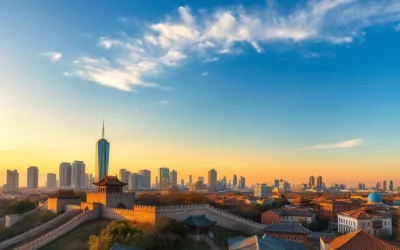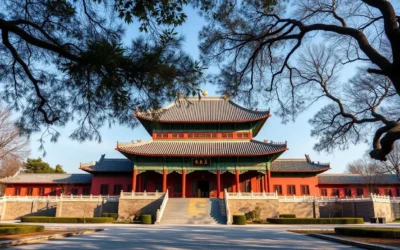✓ Accommodations✓ Flights✓ Rental Cars✓ Tours & Activities
Nestled on the southeastern coast of Fujian Province, Xiamen is a charming city that boasts a unique blend of natural beauty, rich cultural heritage, and modern attractions, making it an ideal destination for travelers.
Known as the “Garden on the Sea,” Xiamen offers a pleasant spring-like climate year-round, making it perfect for a trip at any time. With its world cultural heritage sites like Gulangyu Island and the Hakka Tulou Clusters, this city is a treasure trove of history and culture.
Most visitors find that 2-4 days is sufficient to explore the highlights, but you can easily extend your stay to discover more of what this coastal gem has to offer.
Discovering Xiamen: China’s Garden on the Sea
Xiamen, or China’s Garden on the Sea, offers a unique blend of natural beauty and cultural heritage. As you explore this charming city, you’ll discover a plethora of experiences that cater to all interests.
When to Visit Xiamen
The best time to visit Xiamen is during spring and autumn when the weather is mild and pleasant. These seasons are ideal for touring the city’s outdoor attractions and enjoying the scenic views. Summer can be hot and humid, while winters are generally mild, making Xiamen a year-round destination.
How to Get Around Xiamen
Xiamen has a comprehensive public transportation system, making it easy to get around. You can use the high speed trains to visit nearby cities like Quanzhou, which is about 85km away and takes approximately 0.5-1 hour. Within the city, the Xiamen Metro and public buses are convenient options. For a more leisurely experience, consider renting a bicycle to explore the scenic Huandao Road coastal route. A guide or translation app can be helpful for navigating bus routes with limited English signage.

Gulangyu Island: A UNESCO World Cultural Heritage
Xiamen’s Gulangyu Island is a treasure trove of cultural heritage and natural beauty, waiting to be explored. As a visitor, you can expect a unique experience that blends history, architecture, and scenic landscapes.

Architectural Highlights on Gulangyu
Gulangyu Island is renowned for its diverse architectural styles, reflecting its rich cultural heritage. You can explore the island’s many historic buildings, including former residences of famous figures and museums showcasing the island’s history.
The island’s architecture is a testament to its history as a trading hub and cultural melting pot. Visitors can admire the unique blend of Western and Chinese architectural styles, a characteristic feature of Gulangyu.
Shuzhuang Garden and Sunlight Rock
Two of the island’s most popular attractions are the Shuzhuang Garden and Sunlight Rock. The Shuzhuang Garden is a beautiful example of classical Chinese garden design, offering a serene escape from the hustle and bustle of daily life. Sunlight Rock, on the other hand, is the island’s highest point, providing breathtaking views of Gulangyu and the surrounding sea.
You can enjoy the panoramic views from Sunlight Rock, taking in the island’s lush vegetation and surrounding waters.
Getting to Gulangyu Island
To reach Gulangyu Island, you can take a ferry from one of several terminals in Xiamen. The main departure point is the Xiamen Ferry Terminal (also known as Dongdu International Terminal).
- Two types of ferry services are available: the Tourist Ferry (70 yuan round-trip) and the Public Ferry (35 yuan round-trip).
- All visitors must purchase a Gulangyu Island Environmental Management Fee (tourist entry ticket) for 50 yuan if not included in your ferry ticket.
- Ferry departures are frequent, running approximately every 20 minutes from 7:10 AM to 5:30 PM for tourist ferries.
Once on the island, you can explore on foot, as no motorized vehicles are permitted. Electric golf carts are available for those with mobility issues.
Fujian Tulou: Exploring Hakka Earth Buildings
If you’re looking for a unique cultural experience near Xiamen, Fujian Tulou is a must-visit destination. Fujian Tulou, a UNESCO World Heritage Site, is renowned for its large, communal earthen buildings that have been home to the Hakka people for centuries.

Tianluokeng Tulou Cluster
The Tianluokeng Tulou Cluster is one of the most impressive and well-preserved tulou sites, featuring a collection of earth buildings that showcase the unique architecture and communal lifestyle of the Hakka people. Visiting Tianluokeng offers a glimpse into the history and cultural significance of these structures.
Chengqi Building: The “Earth Building King”
Chengqi Building, often referred to as the “Earth Building King,” is a standout example of tulou architecture. This large, earthen structure is not only an engineering marvel but also a testament to the communal living arrangements of the Hakka people. With its intricate design and historical significance, Chengqi Building is a highlight of any Fujian Tulou visit.
Planning Your Tulou Visit
Planning a visit to Fujian Tulou requires some consideration. The tulou clusters are spread across three counties, including Nanjing, Yongding, and Hua’an. For most visitors, allocating at least one full day is recommended to explore these sites thoroughly. Consider joining an organized guide tour to make the most of your visit, as it includes transportation, entrance fees, and insightful commentary on the history and cultural significance of the tulou.
Xiamen, China: Best Things to Do in the City Center
As you wander through Xiamen’s city center, you’ll uncover a wealth of historical sites and cultural experiences that showcase the city’s unique charm.
Nanputuo Temple
Nanputuo Temple is a revered Buddhist site in Xiamen, known for its stunning architecture and serene atmosphere. Founded in 1651, this temple has a rich history that spans centuries, making it a must-visit destination for those interested in cultural heritage.

Xiamen University Campus
The Xiamen University Campus is a beautiful blend of traditional and modern architecture, set amidst lush greenery. As you stroll through the campus, you’ll experience the vibrant city life and academic atmosphere that defines this prestigious institution.
Hulishan Fortress
Hulishan Fortress is a significant historical landmark that dates back to 1894. This fortress played a crucial role in defending China’s southeastern coastline and offers insights into the region’s military history. Visitors can explore the granite castle, commanding tower, and other structures within the complex. The fortress is open daily from 8:00 AM to 6:00 PM, with an entrance fee of 25 yuan.
Key highlights include the Krupp cannon, one of the world’s largest coastal artillery pieces, and the unique blend of Chinese and European architectural styles. The fortress also offers panoramic views of the Taiwan Strait, allowing visitors to see Kinmen Island, which is under Taiwanese jurisdiction.

Coastal Experiences in Xiamen
With its stunning coastline, Xiamen is a haven for those seeking beach activities and waterfront delights. The city’s southern coastline is particularly popular for its accessible beaches and scenic views.
Cycling Along Huandao Road

Cycling along Huandao Road is a fantastic way to experience Xiamen’s coastal beauty. You can rent a bike and enjoy the scenic views of the sea and surrounding landscape. This activity allows you to stop at various beaches and waterfront areas at your leisure.
Beaches and Waterfront Areas
Xiamen boasts several accessible beaches along its southern coastline, with Baicheng Beach near Xiamen University and Huangcuo Beach in the Zeng Cuo An area being the most popular among visitors. These beaches feature fine golden sand and generally calm waters, making them ideal for swimming and sunbathing.
The city’s waterfront includes beautifully landscaped parks and promenades like Guanyin Mountain Beach Park and Wuyuan Bay Wetland Park, offering alternative ways to enjoy the coastal scenery. Sunset viewing is also a popular activity along the waterfront, with prime spots including the Music Square near the Xiamen International Conference and Exhibition Center and various points along Huandao Road.
Cultural and Culinary Experiences
Xiamen is a city that seamlessly blends tradition with modernity, offering a unique cultural and culinary experience. As you explore the city, you’ll discover a rich tapestry of cultural attractions and delicious local cuisine.
Zhongshan Road Walking Street

Zhongshan Road Walking Street is a must-visit destination for any food enthusiast. This bustling street is lined with a variety of local eateries and shops selling traditional snacks. You can indulge in local delicacies such as oyster omelettes and seafood soups, or simply enjoy the lively atmosphere.
The Eighth Seafood Market
The Eighth Seafood Market is renowned for its fresh seafood. You can sample a wide range of seafood dishes, from steamed fish to seafood hot pots. The market offers an immersive culinary experience, allowing you to taste the best of Xiamen’s seafood.
Zeng Cuo An Cultural Village

Zeng Cuo An is known as “the most exquisite and artistic village in China.” This former fishing village has transformed into a vibrant cultural district, blending historical architecture with contemporary creative spaces. You can explore the village’s labyrinthine layout, visit boutique shops and art studios, and enjoy local snacks and desserts. The village also offers a range of accommodation options, from traditional courtyard guesthouses to design-forward boutique hotels.
Day Trips and Extended Excursions from Xiamen
You can experience the rich cultural heritage and natural beauty of Fujian Province through various day trips from Xiamen. These excursions offer a chance to explore historical sites, cultural landmarks, and scenic areas.
Quanzhou: Starting Point of the Maritime Silk Road
Quanzhou, a significant historical city, is known for its role in the Maritime Silk Road. You can visit ancient sites and experience the city’s rich history.

Jimei School Village
The Jimei School Village, founded by Chen Jiageng, showcases a unique blend of Chinese and Western architectural styles. You can explore the campus, visit the Ao Garden, and see the Dragon Boat Pond.
The school village is a testament to Chen Jiageng’s dedication to education and features several notable buildings, including Jiageng Memorial Hall.

Planning Your Perfect Xiamen Itinerary
Planning your itinerary for Xiamen involves deciding on the right number of days to see its highlights and explore beyond. For most visitors, 2-4 days is ideal for a trip to Xiamen, allowing you to experience the city’s charm and nearby attractions.
A well-planned travel schedule might include Gulangyu Island, city center attractions like Nanputuo Temple, and coastal experiences. If you’re interested in Fujian Tulou, consider adding 1-2 extra days for a deeper exploration, using this guide to make the most of your visit.
The above is subject to change.
Check back often to TRAVEL.COM for the latest travel tips and deals.






